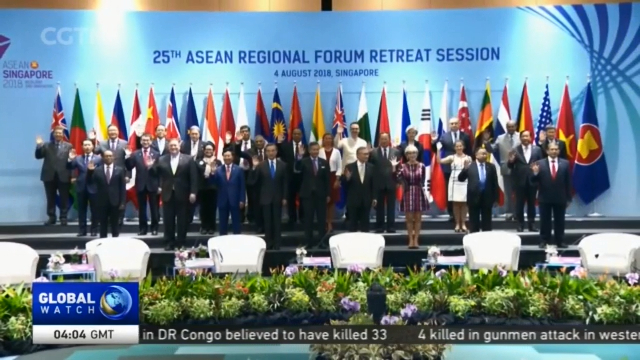
12:54, 05-Aug-2018
ASEAN Foreign Ministers' Meeting: Meetings come to an end, Korean Peninsula issues dominate
Updated
12:34, 08-Aug-2018
03:04

We begin in Singapore, where foreign ministers from ASEAN countries tackled some tough topics this week. Among them were the challenges facing the Korean Peninsula. Host nation Singapore has described the meeting as both necessary and productive. CGTN's Miro Lu reports.
In his closing remarks, Singaporean Foreign Affairs Minister Vivian Balakrishnan said this year's meeting was by far the smoothest, least contentious, and most constructive one yet. He said ASEAN is committed to continue providing a safe space for candid, and brutally frank discussions, especially on issues like the Korean Peninsula and South China Sea. At a press conference earlier, US Secretary of State Mike Pompeo emphasized that diplomatic pressure on the DPRK is vital to the achievement of a completely denuclearised Korean Peninsula.
MIKE POMPEO US SECRETARY OF STATE "I want to remind every nation that has supported these resolutions that this is a serious issue and something that we will discuss with Moscow. We expect the Russians and all countries to abide by UN Security Council resolutions and enforce sanctions on North Korea. Any violation that detracts from the world's goal of finally fully denuclearising North Korea would be something that American would take very seriously."
Chinese State Councillor and Foreign Minister Wang Yi was more optimistic, and said there was visible development on the denuclearization on the Korean Peninsula. He said that this is a direction that China is committed to.
WANG YI CHINESE FOREIGN MINISTER "The Korean nuclear issue has been brought back to the track of seeking peaceful settlements through dialogues and consultations. All parties concerned, including the United States and the DPRK, have arrived at an important consensus that there needs to be parallel progress on both tracks of achieving denuclearisation on the Korean Peninsula, and establishing a peace mechanism there."
MIRO LU SINGAPORE "ASEAN was formed in 1967 not only to counter external threats with a united voice, but also to develop a system for dispute settlements. Meetings like the ASEAN Regional Forum provide a platform for regional and international players to resolve conflicts with quiet diplomacy."
Disagreements on the international stage is commonplace. China and US have accused each other of flexing military muscle in the South China Sea. On the denuclearization front, DPRK's foreign minister Ri Yong Ho maintained Pyongyang's commitment to peace, but said that the US' insistence on economic sanctions is counter-productive to building confidence between the two nations. While it is impossible for every country to agree on all issues, ASEAN continues to believe that dialogue is the way forward. The fact that leaders from China, the United States, Russia, and the DPRK can sit down in the same room for three hours is progress in itself. Miro Lu, CGTN, Singapore.

SITEMAP
Copyright © 2018 CGTN. Beijing ICP prepared NO.16065310-3
Copyright © 2018 CGTN. Beijing ICP prepared NO.16065310-3